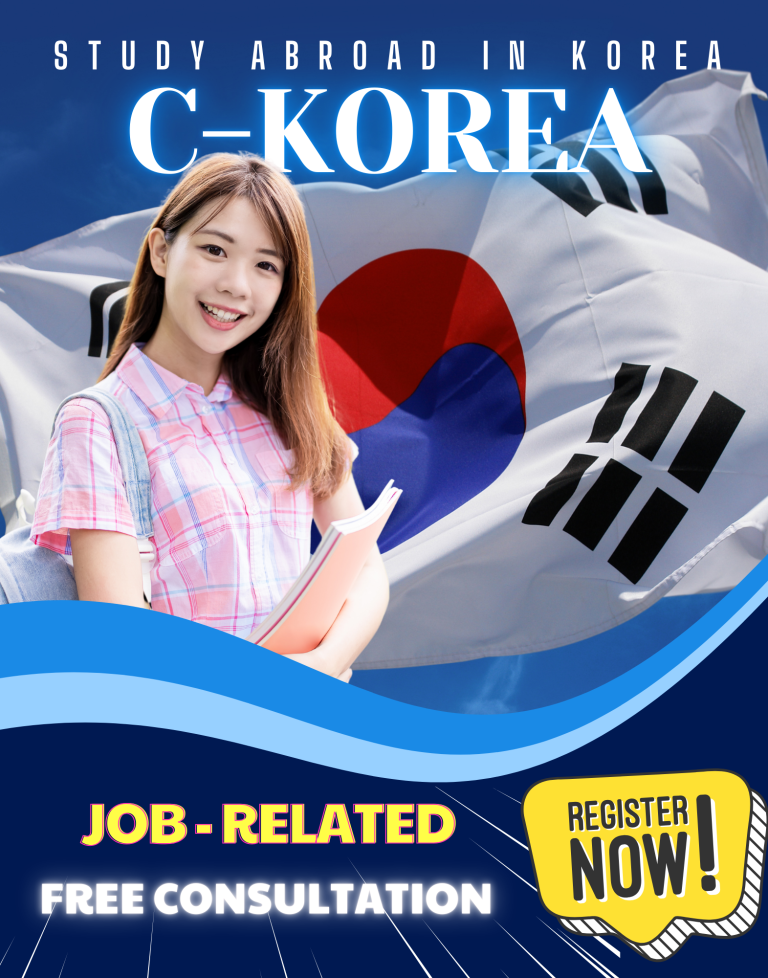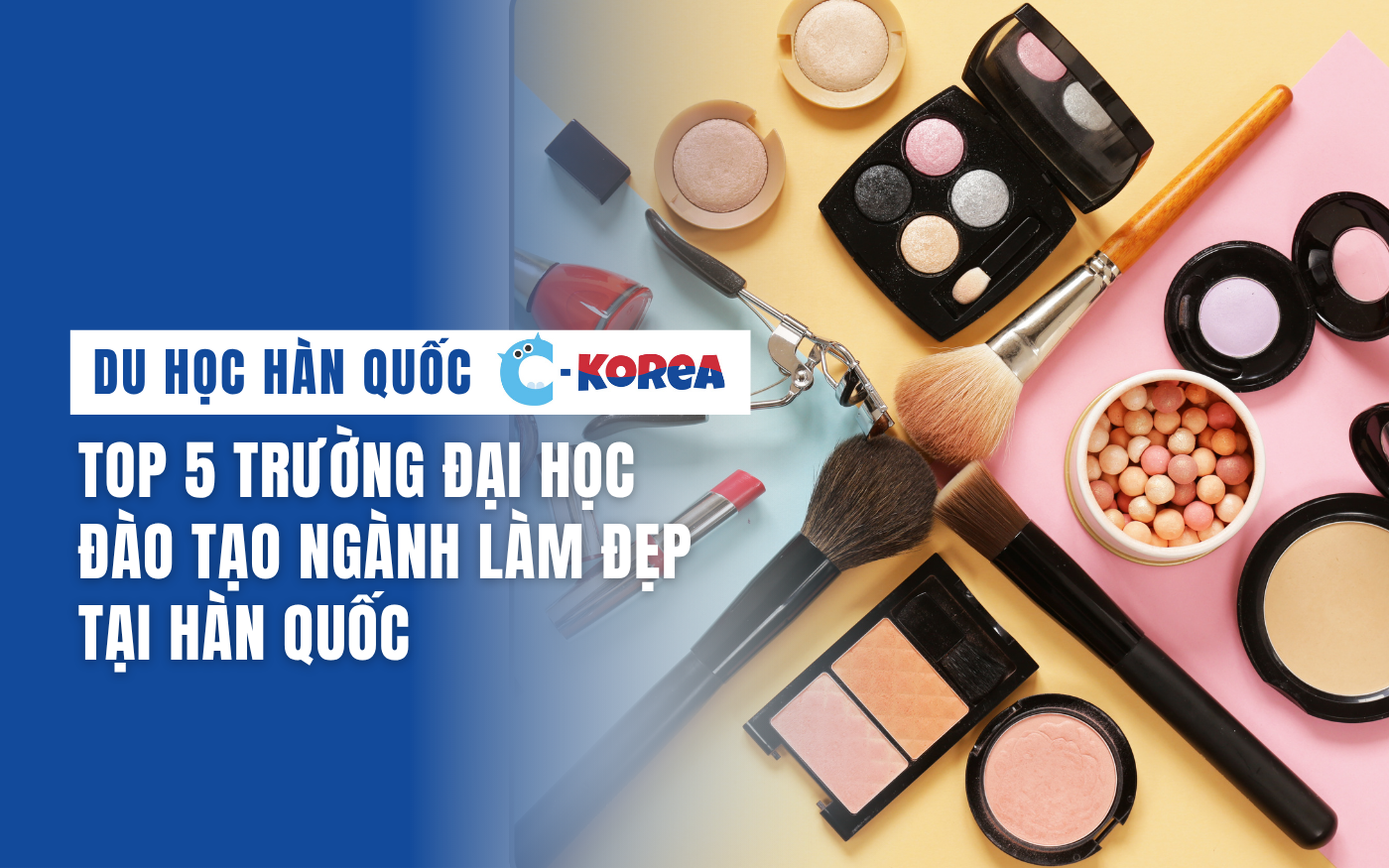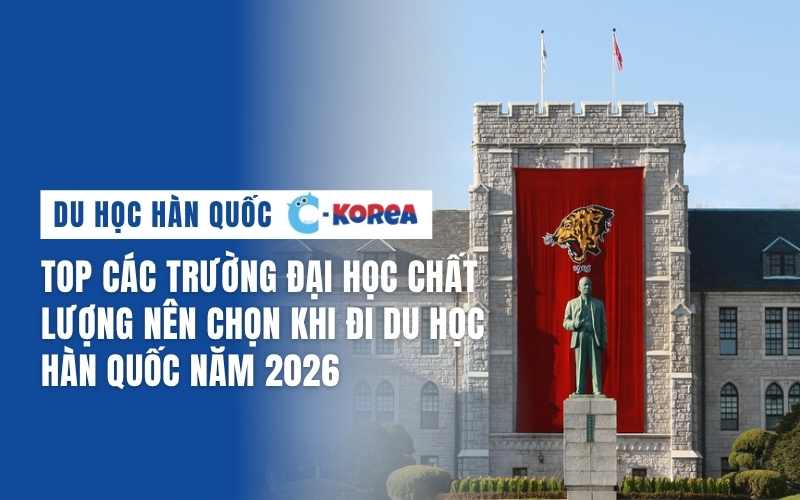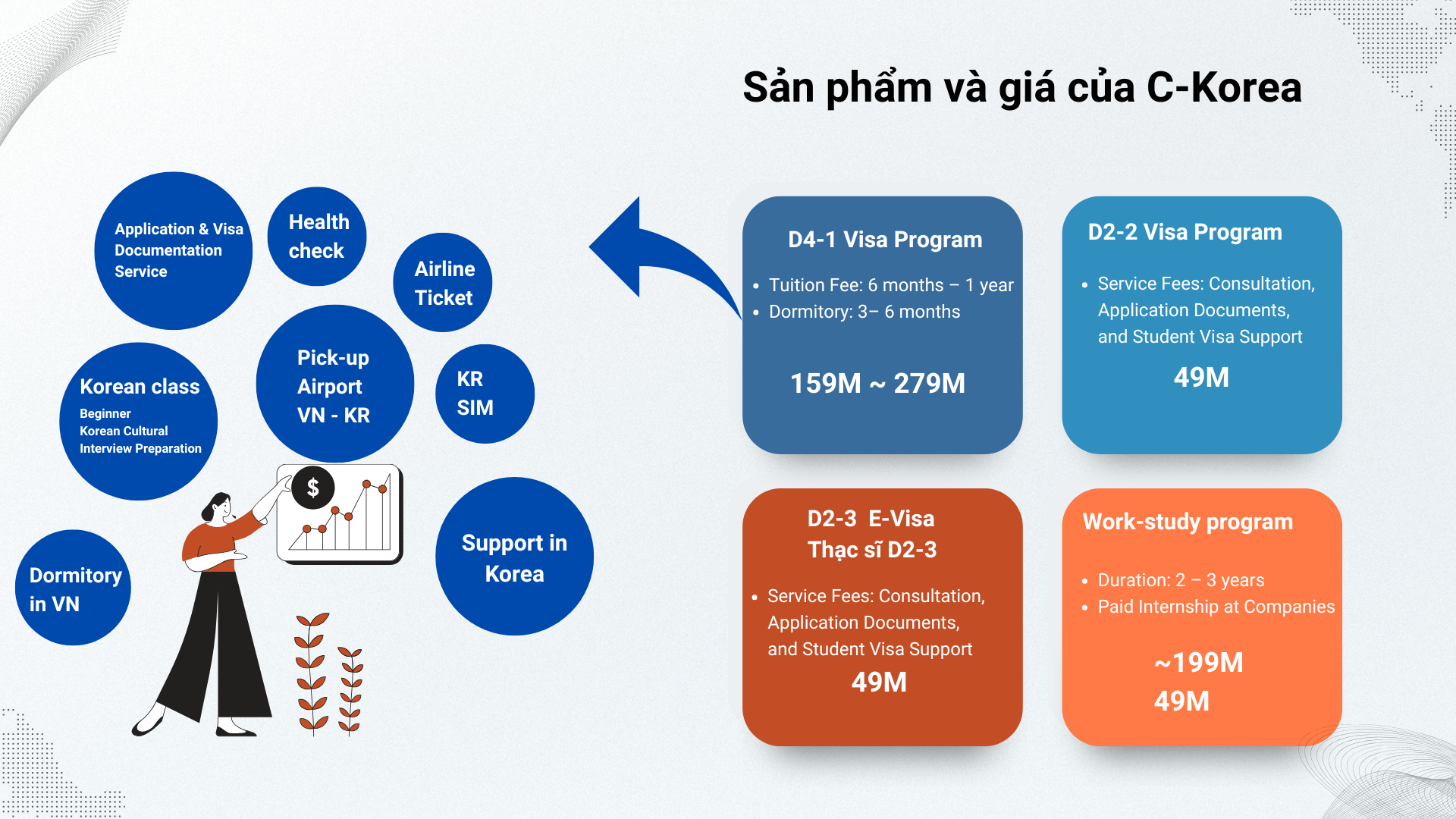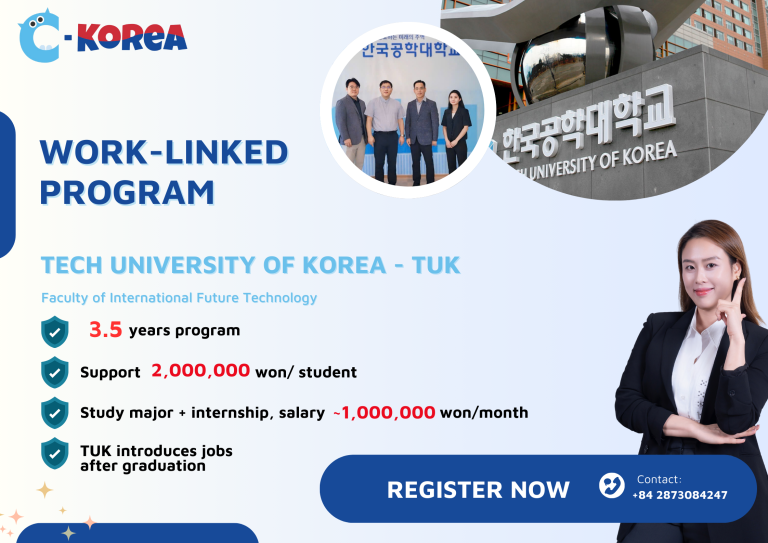I. OVERVIEW OF THE UNIVERSITY
Korean Name: 경상국립대학교
English Name: GYEONGSANG NATIONAL UNIVERSITY
Established: 1910
Number of Students: [Number of students]
Address: 501 Jiju-daero, Jinju, Gyeongsangnam-do, 52828, South Korea
Website: gnu.ac.kr
II. D4 KOREAN LANGUAGE PROGRAM
This course is designed for overseas Koreans and foreigners who wish to learn the Korean language and explore Korean culture. Anyone with an educational background of at least high school can register for the course, providing an opportunity for anyone interested in enhancing their language skills and discovering the rich culture of Korea.
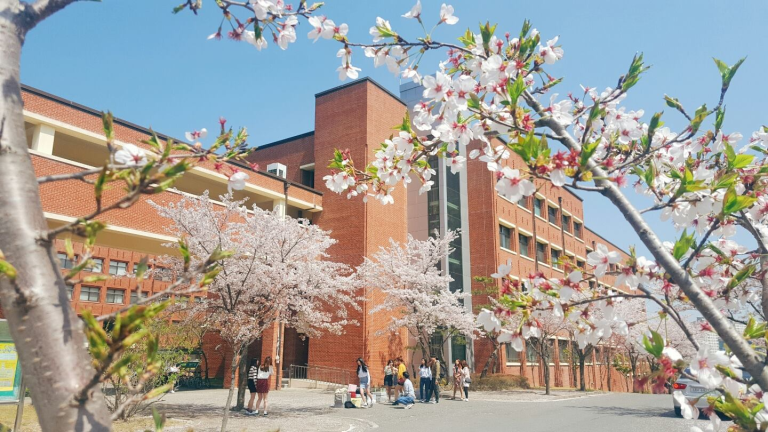
2.1. Admission Information and Requirements
Information:
- Admission periods in the year: March, May, September, November
- The course lasts for 1 year, totaling 40 weeks, equivalent to 800 hours of study.
- Classes are held 5 days a week, from Monday to Friday.
- Each day consists of 4 hours of study, starting from 09:00 to 12:50.
Requirements:
- Financial proof: A certificate showing at least 8,000,000 KRW deposited in a bank under the name of the student or parent for a minimum of 6 months.
- Graduation certificate of the highest education level: (issued within the last 3 years, notarized and certified at the Korean consulate).
2.2. Tuition Fees for the Language Program
| Item |
Amount |
Notes |
| Annual tuition fee |
4,800,000 KRW |
Each semester: 1,200,000 KRW (including textbooks) |
| Dormitory fee (12 months) |
Approximately 3,600,000 KRW |
Includes meals on Saturdays and Sundays |
| Annual insurance fee |
Approximately 100,000 KRW |
Self-paid; will automatically enroll in national health insurance after 6 months |
Note:
- When transferring money in US dollars, exchange rate fluctuations may affect the payment amount. Any excess amount paid will be refunded after enrollment.
- In case of visa denial, the paid amount will be refunded to the student’s account.
2.3. Scholarships
| Type |
Content |
Notes |
| Excellent Academic Scholarship |
For students with outstanding performance in midterm and final exams each semester |
100,000 KRW for the top student in each class |
| University Entrance Exam Scholarship |
For students with high scores in the university entrance exam |
Scholarship amounts vary by performance level |
III. D2 SPECIALIZED PROGRAM
3.1. Registration Requirements
- Nationality must be foreign.
Note: At the time of application, if the candidate holds South Korean nationality (including dual nationality), they are not eligible to apply. If parents are divorced or deceased, the nationality of the divorced or deceased parent will not be considered.
- Educational Background:
a) For new applicants: Candidates must have completed the entire elementary, middle, and high school education in South Korea or abroad.
Note: Those with degrees obtained through testing, homeschooling, or online learning are not eligible to apply.b) For transfer students (entering the 3rd year):
- Candidates must have completed at least 2 years or 4 semesters at a 4-year university in South Korea or abroad.
- Candidates who have graduated or are expected to graduate from a college or vocational school in South Korea or abroad (including those expected to graduate in February 2025).
Note: Current students or students on leave from Gyeongsang National University are not eligible to apply.
- Language Proficiency:
Candidates are required to achieve at least level 3 in TOPIK (or level 2 for programs related to arts and sports) or complete the Intermediate Korean 1 program at Sejong Hakdang.
Only valid language certificates at the time of application will be accepted. If unable to submit the language certificate during the review period, candidates may submit it before the final admission decision, but prior approval from the university is required.
3.2. Notable Majors at Gyeongsang National University
|
University
|
Field of study
|
University
|
Faculty of Science
|
| University of Humanities |
Korean Language & Literature |
University of Technology |
Civil Engineering |
| German Language & Literature |
Urban Engineering |
| Russian Studies |
Civil Engineering |
| French Language & Literature |
Mechanical Engineering |
| History |
Materials Science & Engineering (Major in Polymer Engineering) |
| English Language & Literature (Major in English Language & Literature) |
Materials Science & Engineering (Major in Metal Materials Engineering) |
| English Language & Literature (English Major) |
Materials Science & Engineering (Major in Ceramic Engineering) |
| Chinese Language & Literature |
Industrial Systems Engineering |
| Philosophy |
Architecture |
| Classical Korean Literature in Chinese |
Chemical Engineering |
| Folk Art and Dance |
Future Automotive Engineering |
| University of Social Sciences |
Economics |
Energy Engineering |
| Social welfare |
University of Information Technology (IT) |
Computer Science and Engineering |
| Sociology |
Software Engineering |
| Psychology |
AI Information Technology |
| Political Science |
Semiconductor Engineering |
| Public administration |
Electrical Engineering |
| Family & Child Studies |
Electronic Engineering |
| Media & Mass Communication |
Control Engineering and Robotics |
| University of Science |
Life Sciences |
Mechatronics Engineering |
| Mathematics and Physics |
University of Aeronautics and Space |
Aerospace Engineering |
| Nutrition & Food |
College of Agriculture and Life Sciences |
Resource & Food Economics |
| Apparel & Textiles |
Environmental Science & Forestry |
| Statistics Information |
Environmental Materials Science |
| Geology |
Agronomy |
| Chemistry |
Smart Agriculture Industry |
| Advanced anti-aging materials science |
Horticultural Science |
| Pharmaceutical Engineering |
Food Science & Technology |
| University of Management |
Business administration |
Chemistry Applied Life |
| Management Information System |
Botanical Medicine |
| International Trade |
Animal Science Biology |
| Accounting & Tax |
Animal Science |
| Smart Distribution and Logistics |
Bio-Industrial Machinery Engineering |
|
University
|
Field of study
|
University
|
Faculty of Science
|
| University of Technology |
Civil Engineering |
University of Law |
Jurisprudence |
| Urban Engineering |
University of Education |
Pedagogy |
| Civil Engineering |
History Pedagogy |
| Mechanical Engineering |
Preschool Education |
| Materials Science & Engineering (Major in Polymer Engineering) |
Ethical Pedagogy |
| Materials Science & Engineering (Major in Metal Materials Engineering) |
Social Science Pedagogy |
| Materials Science & Engineering (Major in Ceramic Engineering) |
Geography Pedagogy |
| Industrial Systems Engineering |
Physics Education |
| Architecture |
Biology Education |
| Chemical Engineering |
Mathematics Education |
|
Future Automotive Engineering |
Chemistry Education |
| Energy Engineering |
Veterinary University |
Veterinary Medicine Preparatory (For New Students) |
| University of Information Technology (IT) |
Computer Science and Engineering |
Veterinary (For transfer students, spring semester only) |
| Software Engineering |
University of Civil Engineering & Environment |
Building Systems Engineering |
| AI Information Technology |
Environmental Engineering |
| Semiconductor Engineering |
Interior Materials Engineering |
| Electrical Engineering |
Landscape Architecture |
| Electronic Engineering |
University of Marine Sciences |
Fisheries Management & Marine Business |
| Control Engineering and Robotics |
Coast Guard & Production System |
| Mechatronics Engineering |
Marine Biology & Aquaculture |
| University of Aeronautics and Space |
Aerospace Engineering |
Marine Food Science & Marine Biomedicine |
| College of Agriculture and Life Sciences |
Resource & Food Economics |
Mechanical Systems Engineering |
| Environmental Science & Forestry |
Smart Energy & Mechanical Engineering |
| Environmental Materials Science |
Marine & Ocean Engineering |
| Agronomy |
Marine Engineering |
| Smart Agriculture Industry |
Marine Environmental Engineering |
| Horticultural Science |
|
| Food Science & Technology |
| Chemistry Applied Life |
| Botanical Medicine |
| Animal Science Biology |
| Animal Science |
| Bio-Industrial Machinery Engineering |
3.3. Tuition Fees for Specialized Programs
Tuition Fees by Major
| Classification |
College |
Tuition Fee (won) |
| College of Humanities |
Humanities & Social Sciences |
1,633,000 |
| College of Humanities |
Humanities & Social Sciences (Department of Folk Dance) |
1,876,000 |
| College of Social Sciences |
Humanities & Social Sciences |
1,633,000 |
| College of Natural Sciences |
Natural Sciences |
2,012,000 |
| College of Engineering |
Engineering |
2,165,000 |
| College of Business |
Humanities & Social Sciences |
1,633,000 |
| College of Engineering |
Engineering |
2,165,000 |
| College of Agriculture and Life Sciences |
Humanities & Social Sciences |
1,633,000 |
| College of Agriculture and Life Sciences |
Natural Sciences |
2,012,000 |
| College of Agriculture and Life Sciences |
Engineering |
2,165,000 |
| College of Law |
Humanities & Social Sciences |
1,633,000 |
| College of Education |
Humanities & Social Sciences |
1,633,000 |
| College of Education |
Natural Sciences (Mathematics Education) |
1,633,000 |
| College of Education |
Natural Sciences & Sports |
2,012,000 |
| College of Arts |
Arts |
2,208,000 |
| College of Veterinary Medicine |
Veterinary Preparatory (New Admissions) |
2,503,000 |
| College of Veterinary Medicine |
Veterinary (Transfer) |
2,932,000 |
| College of Convergence Engineering |
Engineering |
2,165,000 |
| College of Civil and Environmental Engineering |
Engineering |
2,165,000 |
| College of Marine Sciences |
Humanities & Social Sciences |
1,633,000 |
| College of Marine Sciences |
Natural Sciences |
2,012,000 |
| College of Marine Sciences |
Engineering |
2,165,000 |
IV. SCHOLARSHIPS FOR INTERNATIONAL STUDENTS AT GYEONGSANG NATIONAL UNIVERSITY
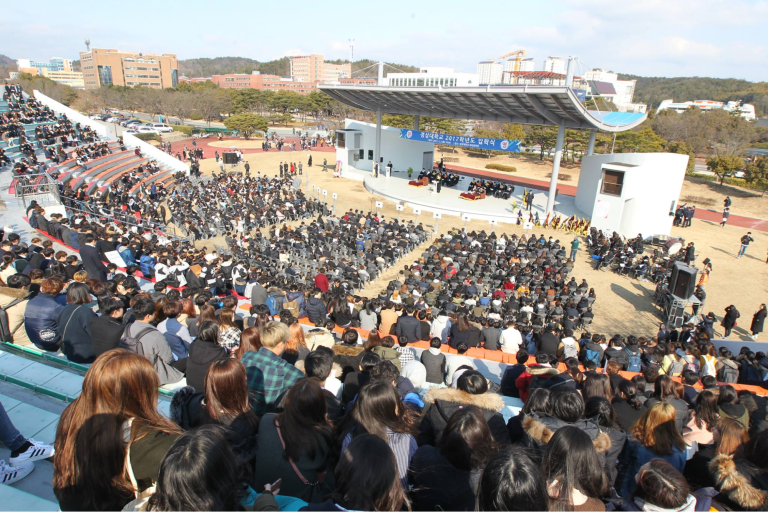 Gyeongsang University students participate in the welcoming ceremony for new students.
Gyeongsang University students participate in the welcoming ceremony for new students.
TOPIK Scholarship
Criteria and Content of Scholarships Based on TOPIK Levels:
| TOPIK Level |
Target Group |
Criteria |
Scholarship Content |
| TOPIK 4 |
New Students |
No score requirement |
100% tuition waiver for the first semester |
| Current Students |
Average grade of 3.0 or higher |
50% tuition reduction |
| Average grade of 3.5 or higher |
2/3 tuition reduction |
| Average grade of 4.0 or higher |
100% tuition waiver |
| TOPIK 5, 6 |
New Students |
No score requirement |
100% tuition waiver for the first semester + 500,000 won living allowance (one-time only |
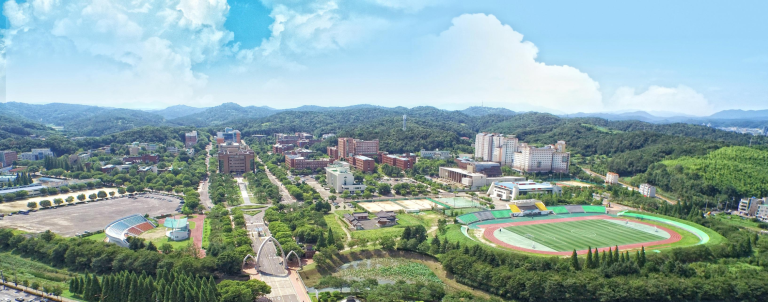 Gyeongsang National University (GNU)
Gyeongsang National University (GNU)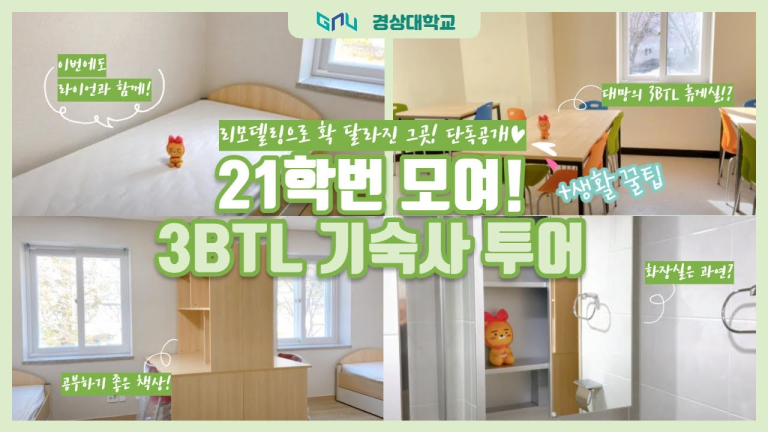 Images of Dormitory Room in the 3BTL Area
Images of Dormitory Room in the 3BTL Area






